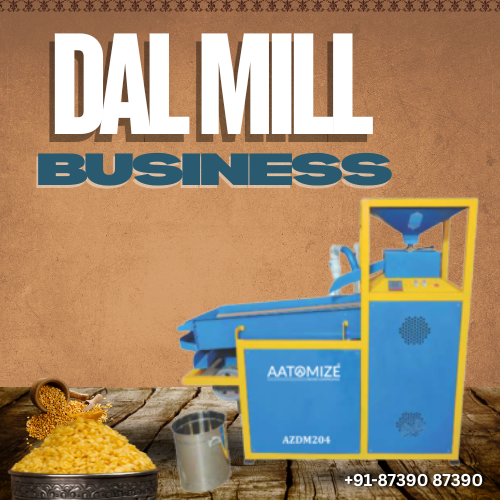
How to Start a Dal Mill Business in 2025: Best Machines and ROI Breakdown
Dal (pulses) is a staple in Indian households and a key ingredient in countless dishes across the country. With the growing demand for quality, processed dal — and rising awareness about hygiene and nutritional value — 2025 is shaping up to be an excellent year to start a dal mill business.
Whether you’re an aspiring entrepreneur or an existing food processor looking to expand, the opportunities in this sector are significant. Here’s a practical guide to getting started, choosing the right machines, and understanding your potential return on investment (ROI).
1. Why Start a Dal Mill Business in 2025?
The Indian pulses market is not only large but also growing steadily. Factors driving demand include:
* Rising population and urbanization
* Increasing health awareness and preference for protein-rich diets
* Government support for pulse processing and agricultural growth
* Growing opportunities for exports to countries with large Indian diaspora
With better technology and automation, starting a dal mill business has become more efficient and less labor-intensive than ever.
2. Understanding the Dal Milling Process
The basic steps involved in dal milling include:
1. Cleaning and grading – Removing dust, stones, and impurities.
2. Pitting or scratching – Preparing the grain for husk removal.
3. Husking – Separating the outer husk from the pulse.
4. Polishing – Giving the dal a smooth finish for better presentation.
5. Packaging – Ensuring freshness, hygiene, and long shelf life.
Modern dal mill machines can perform multiple steps automatically, saving time and reducing the need for manual labor.
3. Choosing the Best Machines for Your Setup
At Aatomize, we specialize in high-performance dal mill machines designed for efficiency, durability, and low operating costs. The type and number of machines you’ll need depend on your production capacity and budget.
Essential machines include:
* Dal Cleaning Machine – Removes stones, dust, and other impurities.
* Dal Splitter / Pitting Machine – Prepares the pulses for husking.
* Husking Machine – Efficiently separates the husk from dal.
* Polisher – Improves the appearance and market appeal of the final product.
* Grading Machine – Sorts dal into uniform sizes for quality consistency.
Many entrepreneurs start with a semi-automatic line to keep initial costs lower, then upgrade to a fully automated setup as demand grows.
4. Space, Setup, and Staffing
A small- to medium-scale dal mill can be set up in 1,000–2,000 sq. ft. of space, preferably in an industrial area with good transport access. You’ll also need storage for raw pulses and finished products.
For semi-automatic operations, a team of 5–10 workers can handle production, quality checks, and packaging. Automation can further reduce manpower requirements.
5. Investment and ROI Breakdown
Here’s a rough estimate for a small-to-medium-scale dal mill in 2025 (figures may vary based on location and capacity):
* Machinery cost: ₹8–₹15 lakh (depending on automation level and capacity)
* Installation & setup: ₹1–₹2 lakh
* Working capital (raw materials, packaging, utilities): ₹3–₹5 lakh
* Total initial investment: ₹12–₹22 lakh
Earnings potential:
* Daily output: 500–1,000 kg of dal
* Average selling price: ₹80–₹120 per kg (depending on type and quality)
* Gross revenue per month: ₹8–₹12 lakh (assuming 25 working days)
ROI timeline:
Most small-to-medium dal mill setups can recover their investment within 12–18 months, provided they maintain quality, secure a consistent supply, and build a reliable distribution network.
6. Tips for Success in the Dal Mill Business
* Source quality raw pulses – Partner with reliable farmers or suppliers to ensure consistent quality.
* Maintain hygiene standards – Modern consumers value clean, contamination-free products.
* Offer variety – Different dals (toor, moong, chana, masoor, urad) cater to wider markets.
* Invest in branding and packaging – Attractive, food-grade packaging can increase market value.
* Build strong distribution – Sell through wholesalers, retailers, and direct-to-consumer platforms.
* Keep an eye on trends – Organic and unpolished dals are gaining popularity in health-conscious markets.
7. Why Choose Aatomize Machines?
At Aatomize, our dal mill machines are designed to deliver:
* High efficiency – Process more dal in less time.
* Low maintenance – Durable build for long-term use.
* Energy savings – Lower operating costs for better profitability.
* User-friendly operation – Minimal training needed for operators.
Our team also offers installation, training, and after-sales support, ensuring you can start production smoothly and scale up when you’re ready.
Wrapping Up
To wrap up, starting a dal mill business in 2025 is a promising opportunity with strong demand, modern technology, and good profit potential. With the right setup, quality-focused operations, and reliable machines, you can build a sustainable and profitable business within a year or two.
If you’re ready to explore the dal milling business, Aatomize can guide you from planning to production—with the best machines to maximize your returns.